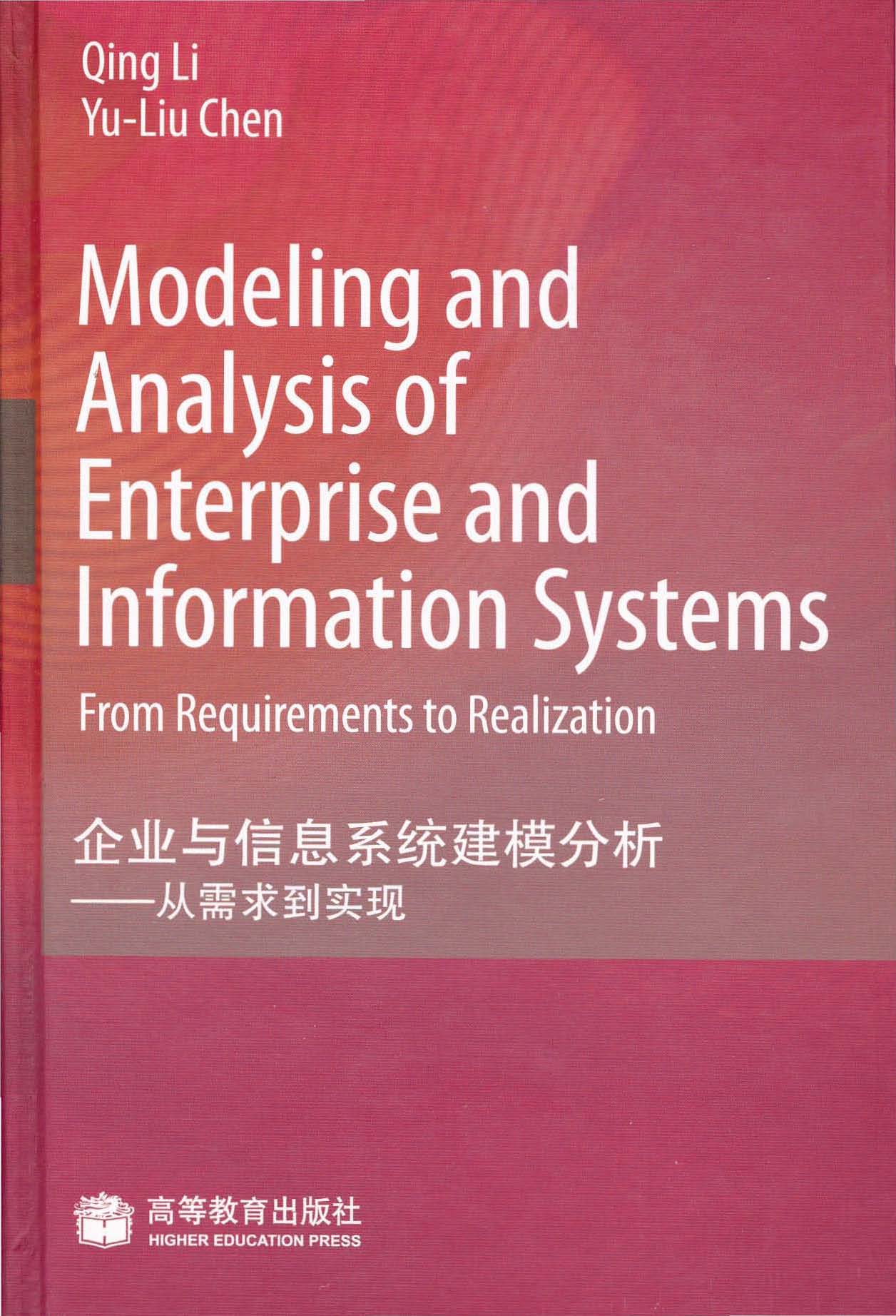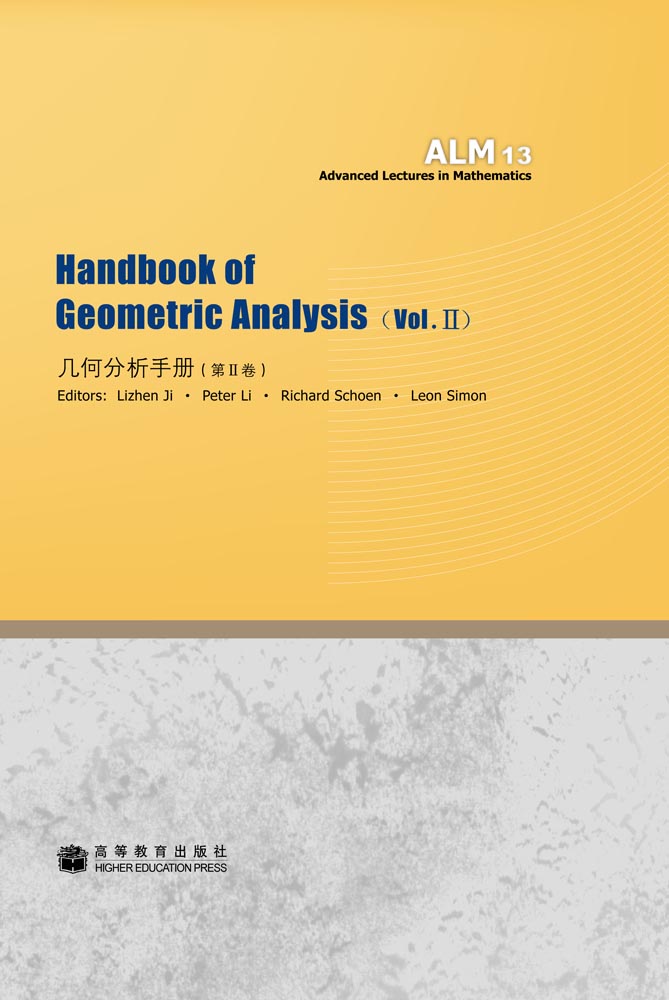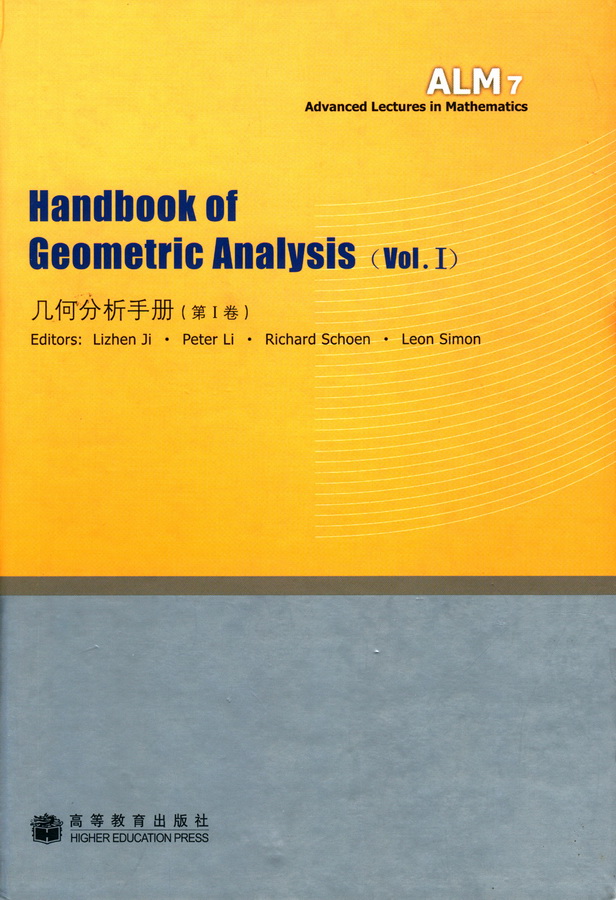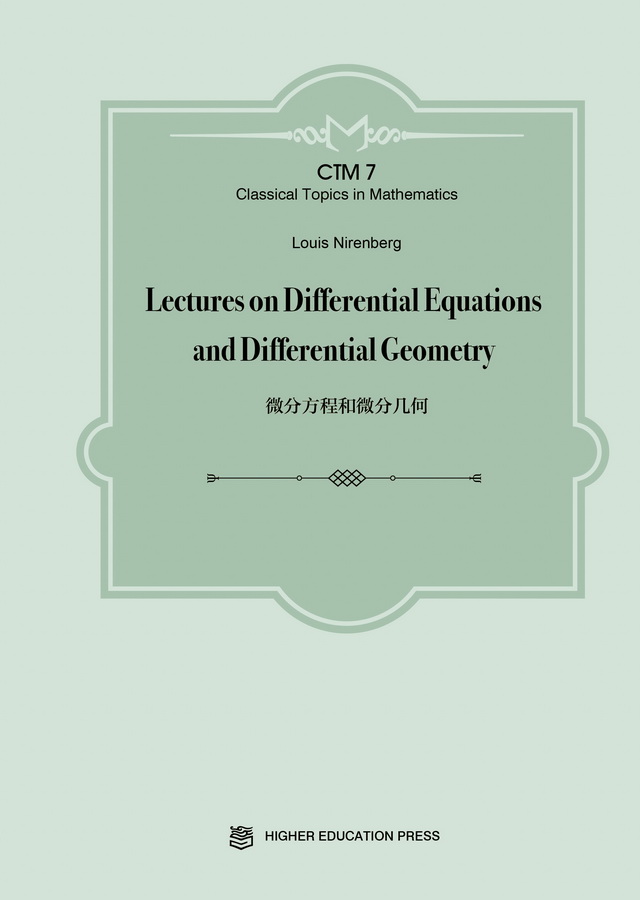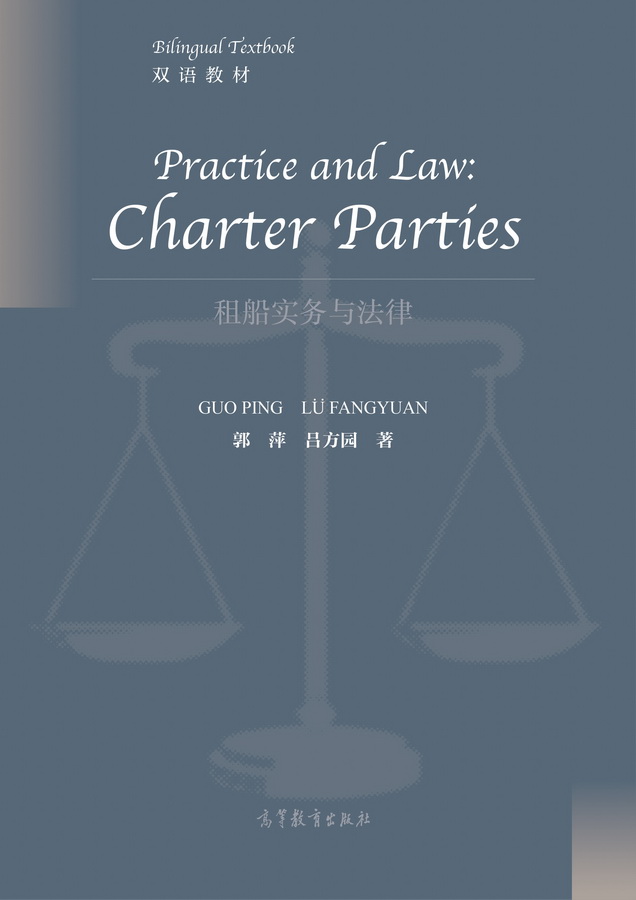几何分析手册(第III卷,英文版)
作者: Lizhen Ji等主编
出版时间:2010-03
出版社:高等教育出版社
- 高等教育出版社
- 9787040288841
- 1版
- 227494
- 48266040-4
- 精装
- 16开
- 2010-03
- 580
- 472
- 理学
- 数学类
- O18
- 数学几何
- 研究生及以上
Geometric Analysis combines differential equations and differential geometry. An important aspect is to solve geometric problems by studying differential equations. Besides some known linear differential operators such as the Laplace operator, many differential equations arising from differential geometry are nonlinear. A particularly important example is the Monge-Ampere equation. Applications to geometric problems have also motivated new methods and techniques in differential equations. The field of geometric analysis is broad and has had many striking applications. This handbook of geometric analysis provides introductions to and surveys of important topics in geometric analysis and their applications to related fields which is intend to be referred by graduate students and researchers in related areas
Front Matter
A Survey of Einstein Metrics on 4-manifolds
Michael T. Anderson
1 Introduction
2 Brief review: 4-manifolds, complex surfaces and Einstein metrics
3 Constructions of Einstein metrics I
4 Obstructions to Einstein metrics
5 Moduli spaces I
6 Moduli spaces II
7 Constructions of Einstein metrics II
8 Concluding remarks
References.
Sphere Theorems in Geometry
Simon Brendle, Richard Schoen
1 The Topological Sphere Theorem
2 Manifolds with positive isotropic curvature
3 The Differentiable Sphere Theorem.
4 New invariant curvature conditions for the Ricci flow.
5 Rigidity results and the classification of weakly 1/4-pinched manifolds
6 Hamilton’s differential Harnack inequality for the Ricci flow
7 Compactness of pointwise pinched manifolds
References.
Curvature Flows and CMC Hypersurfaces
Claus Gerhardt
1 Introduction
2 Notations and preliminary results
3 Evolution equations for some geometric quantities
4 Essential parabolic flow equations
5 Existence results
6 Curvature flows in Riemannian manifolds
7 Foliation of a spacetime by CMC hypersurfaces
8 The inverse mean curvature flow in Lorentzian spaces
References.
Geometric Structures on Riemannian Manifolds
Naichung Conan Leung
1 Introduction
2 Topology of manifolds.
2.1 Cohomology and geometry of differential forms
2.2 Hodge theorem
2.3 Witten-Morse theory
2.4 Vector bundles and gauge theory
3 Riemannian geometry.
3.1 Torsion and Levi-Civita connections
3.2 Classification of Riemannian holonomy groups
3.3 Riemannian curvature tensors
3.4 Flat tori
3.5 Einstein metrics
3.6 Minimal submanifolds.
3.7 Harmonic maps
4 Oriented four manifolds
4.1 Gauge theory in dimension four
4.2 Riemannian geometry in dimension four.
5 K¨ahler geometry
5.1 K¨ahler geometry — complex aspects
5.2 K¨ahler geometry — Riemannian aspects
5.3 K¨ahler geometry — symplectic aspects
5.4 Gromov-Witten theory.
6 Calabi-Yau geometry.
6.1 Calabi-Yau manifolds
6.2 Special Lagrangian geometry.
6.3 Mirror symmetry
6.4 K3 surfaces
7 Calabi-Yau 3-folds
7.1 Moduli of CY threefolds
7.2 Curves and surfaces in Calabi-Yau threefolds
7.3 Donaldson-Thomas bundles over Calabi-Yau threefolds
7.4 Special Lagrangian submanifolds in CY3
7.5 Mirror symmetry for Calabi-Yau threefolds.
8 G2-geometry.
8.1 G2-manifolds
8.2 Moduli of G2-manifolds
8.3 (Co-)associative geometry.
8.4 G2-Donaldson-Thomas bundles
8.5 G2-dualities, trialities and M-theory
9 Geometry of vector cross products
9.1 VCP manifolds
9.2 Instantons and branes
9.3 Symplectic geometry on higher dimensional knot spaces
9.4 C-VCP geometry
9.5 Hyperk¨ahler geometry on isotropic knot spaces of CY
10 Geometry over normed division algebras
10.1 Manifolds over normed algebras
10.2 Gauge theory over (special) A-manifolds
10.3 A-submanifolds and (special) Lagrangian submanifolds
11 Quaternion geometry
11.1 Hyperk¨ahler geometry
11.2 Quaternionic-K¨ahler geometry
12 Conformal geometry
13 Geometry of Riemannian symmetric spaces
13.1 Riemannian symmetric spaces
13.2 Jordan algebras and magic square.
13.3 Hermitian and quaternionic symmetric spaces
14 Conclusions.
References.
Symplectic Calabi-Yau Surfaces
Tian-Jun Li
1 Introduction
2 Linear symplectic geometry
2.1 Symplectic vector spaces
2.2 Compatible complex structures
2.3 Hermitian vector spaces
2.4 4-dimensional geometry
3 Symplectic manifolds
3.1 Almost symplectic and almost complex structures
3.2 Cohomological invariants and space of symplectic structures
3.3 Moser stability and Darboux charts
3.4 Submanifolds and their neighborhoods
3.5 Constructions.
4 AlmostK¨ahler geometry
4.1 Almost Hermitian manifolds, integrability and operators
4.2 Levi-Civita connection
4.3 Connections and curvature on Hermitian bundles
4.4 Chern connection and Hermitian curvatures
4.5 The self-dual operator
4.6 Dirac operators
4.7 Weitzenb¨ock formulas and some almost K¨ahler identities
5 Seiberg-Witten theory–three facets
5.1 SW equations.
5.2 Pin(2) symmetry for a spin reduction.
5.3 The compactness and Hausdorff property of the moduli space
5.4 Generic smoothness of the moduli space.
5.5 Furuta’s finite dim. Approximations
5.6 SW invariants
5.7 Symplectic SW equations and Taubes’ nonvanishing
5.8 Symplectic SW solutions and Pseudo-holomorphic curves
5.9 Bordism SW invariants via finite dim. Approximations
5.10 Mod 2 vanishing and homology type
6 Symplectic Calabi-Yau equation
6.1 Uniqueness and openness
6.2 A priori estimates
7 Symplectic Calabi-Yau surfaces
7.1 Symplectic birational geometry and Kodaira dimension
7.2 Examples
7.3 Homological classification
7.4 Further questions
References.
Lectures on Stability and Constant Scalar Curvature
D.H. Phong, Jacob Sturm
1 Introduction
2 The conjecture of Yau
2.1 Constant scalar curvature metrics in a given K¨ahler class
2.2 The special case of K¨ahler-Einstein metrics
2.3 The conjecture of Yau
3 The analytic problem.
3.1 Fourth order non-linear PDE and Monge-Amp`ere equations
3.2 Geometric heat flows
3.3 Variational formulation and energy functionals
4 The spaces Kk of Bergman metrics
4.1 Kodaira imbeddings
4.2 The Tian-Yau-Zelditch theorem.
5 The functional Fω0 (φ) on Kk
5.1 Fω0 and balance imbeddings
5.2 Fω0 and the Euler-Lagrange equation R − R = 0
5.3 Fω0 and Monge-Amp`ere masses
6 Notions of stability
6.1 Stability in GIT
6.2 Donaldson’s infinite-dimensional GIT
6.3 Stability conditions on Diff(X) orbits
7 The necessity of stability
7.1 The Moser-Trudinger inequality and analytic K-stability
7.2 Necessity of Chow-Mumford stability.
7.3 Necessity of semi K-stability
8 Sufficient conditions: the K¨ahler-Einstein case.
8.1 The α-invariant
8.2 Nadel’s multiplier ideal sheaves criterion
8.3 The K¨ahler-Ricci flow.
9 General L: energy functionals and Chow points
9.1 Fω and Chow points
9.2 Kω and Chow points
10 General L: the Calabi energy and the Calabi flow ..
10.1 The Calabi flow.
10.2 Extremal metrics and stability
11 General L: toric varieties
11.1 Symplectic potentials
11.2 K-stability on toric varieties
11.3 The K-unstable case.
12 Geodesics in the space K of K¨ahler potentials
12.1 The Dirichlet problem for the complex Monge-Amp`ere equation.
12.2 Method of elliptic regularization and a priori estimates
12.3 Geodesics in K and geodesics in Kk
References.
Analytic Aspect of Hamilton’s Ricci Flow
Xi-Ping Zhu
Introduction.
1 Short-time existence and uniqueness
2 Curvature estimates
2.1 Shi’s local derivative estimates
2.2 Preserving positive curvature
2.3 Hamilton-Ivey pinching estimate
2.4 Li-Yau-Hamilton inequality
3 Singularities of solutions
3.1 Can all types of singularities be formed
3.2 Singularity models
3.3 Canonical neighborhood structure.
4 Long time behaviors
4.1 The Ricci flow on two-manifolds
4.2 The Ricci flow on three-manifolds
4.3 Differential Sphere Theorems
References.
版权


